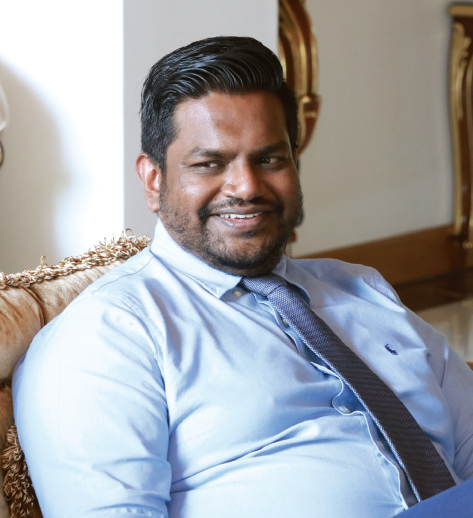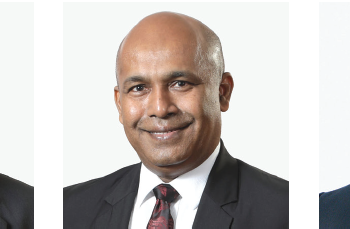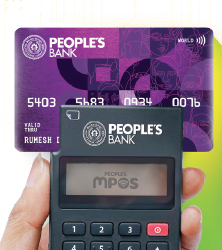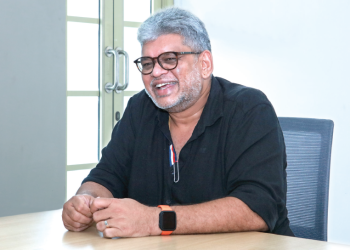A man of big thoughts but few words, Indra Silva is the unassuming business doyen many would like to learn from. The colossus behind Indra Traders Private Limited, a company that started selling vehicles in 1974, Indra Silva, has quoted success and not controversy in his nearly fifty years in business. When one would expect him to embrace the spotlight that comes with the prominent territory of businesspeople, he consciously shies away, investing more energy in prudently managing and expanding his business into other domains through astute decision-making. Indra Silva is also a humanitarian who reveals the man of action rather than words, quietly reaching out to those in need, his benevolence not on public display. Some of his most recent outreach programs include being a founder donor of the newly built cancer unit of the Kandy General Hospital. When the health apparatus was crumbling under COVID-19 pressure, he made a dedicated ward for COVID-19 patients at the Kandy General Hospital and provided intensive care beds to the Peradeniya Teaching Hospital. From distributing water purification systems to people in the north-central province challenged by access to safe water, rebuilding communities devastated by natural disasters, and rising to serve when called to, Indra Silva embraces a low-key approach to social service. A father of five, as he reaps the fruits of his hard work, he steps back to allow his children to navigate the business subsidiaries. Speaking to Business Today, Indra Silva reminisced about his business journey built on honesty. His sons, Rushanka and Hashindra, told of their roles in an expanded business where their father’s core values guide them and their siblings to continue his legacy of trust.
Words: Jennifer Paldano Goonewardane.
Photography: Sujith Heenatigala and Dinesh Fernando.
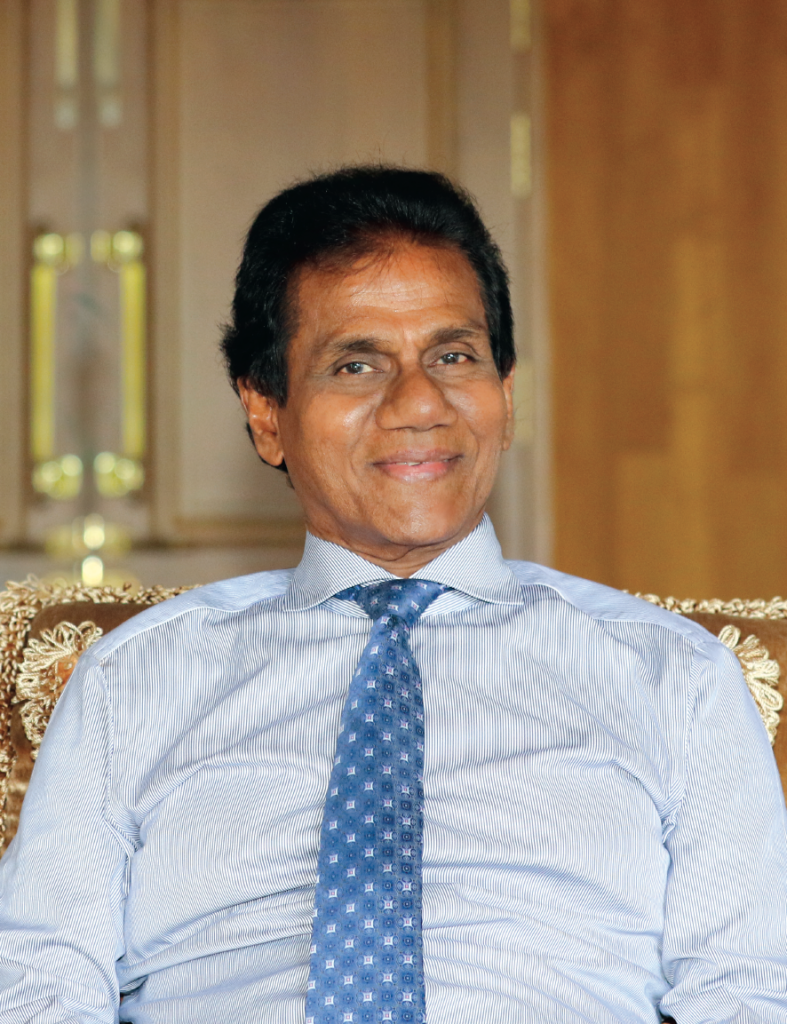
Indra Silva
How did you start Indra Traders during a difficult time in the country and grow?
I was nineteen when I started my first business selling vehicles. The 1970s was a challenging period for businesses dealing with imported goods as import substitution had curtailed the inflow of foreign goods. However, I pursued and managed to engage with customers successfully. When I launched into business as a teenager, I had the privilege of inheriting my family’s business acumen, as my father was also a businessman. My father was the first to trade in used cars, which he started in 1940, while he was also one of the pioneering businessmen selling automobile safety glasses. By twenty, I had built my business substantially independently and under my name, poised for growth. I was one of the earliest to venture into the vehicle trading business in Sri Lanka. Sri Lanka has been through different cycles of events, such as unrest and restrictive regimes that have challenged its onward march. However, I was never afraid to make bold decisions, yet one has to be wise and savvy to navigate the obstacles, which I did successfully.
What was the most outstanding quality that helped you succeed as an entrepreneur?
My greatest strength as a businessman was honesty. Yes, I did have the initial backing of my family, but the business evolved from scratch under a new name. Initially, I built my business selling vehicles bought from the local market as import restrictions prevailed, until after 1978 when the market was opened to importing vehicles, which changed the business trajectory overwhelmingly, commencing our growth journey. As I said, the operating environment was initially risky, so selling used cars in the local market was not a popular business choice. However, I stepped into it determined to be honest, adhere to quality and deliver value for money. I had a hands-on approach to my business and an excellent team that understood my requirements. A key factor was facilitating customer interaction to meet their needs and promptly addressing their concerns by providing solutions. The fact that our customers had access to us gave them confidence. As a businessman, I didn’t take shortcuts. I believe in maintaining an honest relationship with customers.
Trust was the core value of Indra Traders, which I continue to uphold even as the business has diversified and passed on the same values to my children, who are taking over the company’s next chapter. Customers shall be our priority, and nothing can replace the immense contribution of customers’ trust to business success. Business growth was not solely a profit-based measurement to me. Customers were my sole focus, and building trust was a priority so they could always come back while recommending us without hesitation to others. After-sales service and maintenance are an essential extension of the trust I built with my customers, who patronize them with equal loyalty.
Maintaining customer relationships built on trust has seen generations of loyal customers doing business with us. I have gone the extra mile to ensure that an unhappy customer leaves with their confidence in us intact. I wouldn’t hesitate to offer a better alternative if that helps sustain the relationship. Maintaining customers’ trust in us is a sacred tenet I perpetuate in every work area. And that’s the core to business success. Customers come with a need and believe we will fulfil their requirements honorably. Business deceit comes to bite you eventually. Building people’s trust based on honesty has been my greatest strength and the secret to my success.
From an initial business of trading in vehicles, today Indra Traders has branched into finance, property and leisure. What can you tell us about that?
In the 1980s, I began building a property portfolio as I foresaw their future potential in a diversified business. Land value accrues over time and is an essential asset for future ventures. Today, my wisdom has paid off as two valuable properties in my land bank have become prime properties for development. As we launched our subsidiaries, Indra Hotel and Resorts and Indra Property Development, two large-scale projects are coming up on two properties I acquired long ago. Trizen is a unique apartment complex that extends from Braybrooke Place to Union Place, allowing access to two vital points in Colombo. Securing this large area came with the enormous challenge of purchasing parcels of land belonging to business entities and long-standing private owners to make a single whole, a fifteen-year struggle that I accomplished with patience and perseverance. Although it was a huge challenge, I kept going to raise the required plot to build the project I envisaged. My initial plan was to do the project on my own. However, we found collaborating more viable, which we did as a 50-50 joint venture with John Keells Properties and Indra Traders. The developers have managed to sell 77 percent of the 891 apartments consisting of three residential towers, which is a remarkable achievement given the challenging environment in which the project has progressed. Cinnamon Red in Kandy is our first leisure venture with Cinnamon Hotels and Resorts, a subsidiary of John Keells, with a 60 percent stake by Indra Traders. The hotel with 216 rooms is being built on our property and is the first of the lean luxury segment in Kandy that combines economy and design.
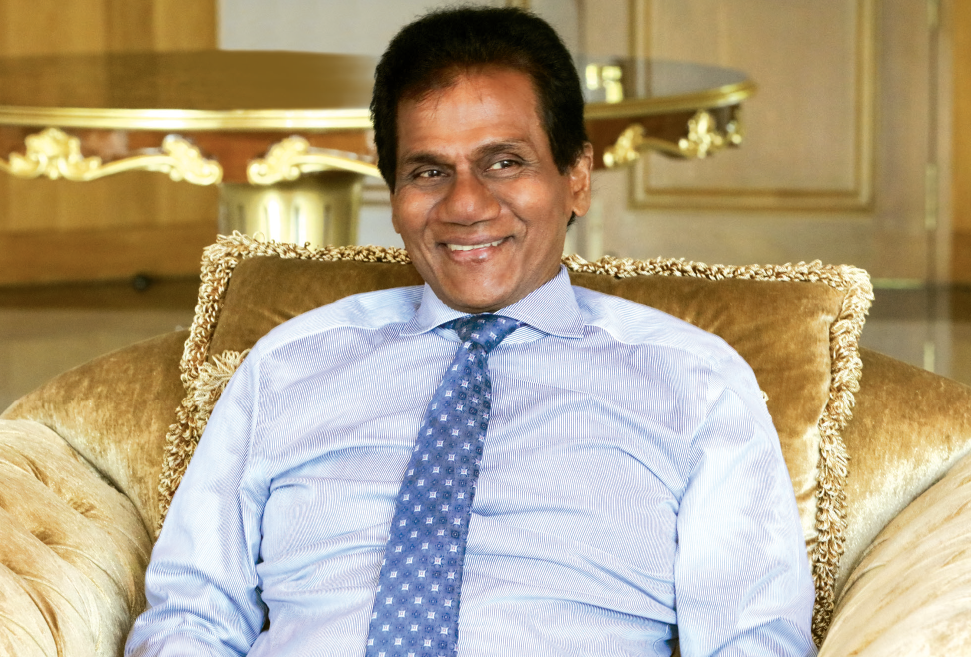
Rushanka Silva: I am the Chairman of Braybrooke Residential Properties (Pvt.) Ltd and Braybrooke Residential Towers (Pvt.) Ltd, a joint venture company of Indra Traders. We have partnered with John Keells Properties to build Trizen apartments, a choice based on their stability and reputation as a significant Sri Lankan conglomerate amid the many offers we received from interested parties. We commenced the project in 2018, but the stream of unprecedented events, starting with the pandemic and culminating with the economic crisis, pitted us against insurmountable challenges and changes. Despite the lockdowns, the fact that we had given the construction to China State Construction Engineering Corporation ensured that work continued. It still holds much value as a symbol of modern smart living, enabling us to carry out 77 percent sale of its inventory. Its location and proximity to business centers, schools, hospitals, hotels and entertainment venues make it a valuable investment for those intending to move to the heart of Colombo with its affordable entry price. It combines excellent location and convenience with a suite of residential amenities, including green spaces, a jogging track, swimming pools, fitness and wellness studios, and a games room, among many others.
Cinnamon Red will be the largest hotel in Kandy that combines state-of-the-art hotel infrastructure with healthy and efficient green building principles. This built environment aligns with the natural environment. It is a conscious choice to support the environmental and sustainability governance goals with the project’s vision and mission. The LEED gold certification we aim to obtain for our project is a testament to our commitment to designing, constructing, and maintaining a high-performance green building, making our proposition even more valuable as an environmentally friendly project.
What guided you to invest in buying shares in banks?
I was one of the first people to invest in Sampath Bank when N U Jayewardene started it in 1987, whom I knew well, having conducted business with Mercantile Credit he headed. Hence, I trusted his wisdom and ability to build a formidable institution, which he did as we saw the bank’s growth over the years. My son Rushanka Silva is the Deputy Chairman of Sampath Bank and its subsidiary, Siyapatha Finance.
I also invested in Commercial Bank, a very stable and promising bank. We are some of the oldest investors in these two entities and continue to hold them. Our relationship with these financial institutions was mutually beneficial as we facilitated substantial vehicle leasing and financing business.
Trust was the core value of Indra Traders, which I continue to uphold even as the business has diversified and passed on the same values to my children, who are taking over the company’s next chapter.
I invested in these two banks because I believed that, as two native banks, they could grow and stimulate business growth in the country. I n ever pursued hostile takeovers to parade my strength and seek the spotlight because my intentions were strategic and well-defined. Today, I s ee the outcomes of these prudent investments.
Commercial Bank acquired a hundred percent stake in Indra Finance in 2014, our vehicle business’s financing and leasing arm established in the early 1980s. It was one of the first transactions under the Financial Sector Consolidation Roadmap authorized by the Sri Lanka Central Bank, and our unique business model of zero deposit mobilization leading to a clean slate of zero liabilities accelerated the merger. Under our management, the finance arm ran a very successful business, benefiting from its close affiliation with Indra Traders’ sale of passenger and commercial vehicles. We offered lease facilities, hire purchase, mortgage loans and other credit facilities for those purchasing our vehicles through this financing facility. Our unique model with no liabilities was ideal for Commercial Bank’s needs as it sought to expand its leasing operations.
Not many in today’s generation would know that you were a bold investor in the 1980s who sponsored one of the most popular musical programs in the early days of television. Can you tell us about your foray into sponsoring programs that no other business in the country had thought of doing?
Television in the 1980s was burgeoning in Sri Lanka, and there were just two State-owned channels, the ITN and Rupavahini, of which the latter had extensive coverage in the country. Given their infancy, television entertainment was still growing. Hence, when the first musical entertainment program, Nandana Vindana, a monthly program, was launched, Indra Traders came on board as its sponsor, a departure and a n ew beginning in the country, something that was hitherto unheard of. It was a wise decision and a bold one, given the times. My intuition always paid off as Nandana Vindana became the most-watched entertainment program Sri Lankans embraced wholeheartedly. It became a m onthly fixture that Sri Lankans couldn’t wait to watch. And I took that intrepid decision, an exception rather than the norm in a country where television entertainment was mostly foreign and no other local business had considered the opportunities companies gain from the visibility they receive from sponsoring programs. In turning out the commercials shown during the program, the late D B Nihalsinha, one of the best directors and cinematographers, helped me create the content through his company – Telecine. I was already sponsoring musical programs and cricket commentaries on radio, the only available radio station being the State-owned Sri Lanka Broadcasting Corporation. Sponsoring cricket matches was another big decision I made in the 1980s. It was a time when international cricket matches were slowly progressing from radio commentary to television in Sri Lanka. I took the lead in sponsoring Tests and one-day international matches on TV. In those early days of television, the Rupavahini crew faced several hurdles in telecasting live matches from Kandy as technology was not so advanced with poor transmitting signals. As the sponsor, we would support the television team by seeking ideal locations for transmission in Madulkele.
Looking back, I am proud that I was a businessman who pushed the boundaries innovatively and paved the way for a pervasive trend that we see today, which has come full circle. Consultants’ advice didn’t drive those decisions. The wisdom was mine, and we did reap the benefits of it as the program had gained a large viewership that repeatedly watched the Indra Traders advertisement, which made the name synonymous with vehicle trading. Such was its impact and reach that people came in scores from everywhere to Kandy to buy our vehicles. But by the time I ventured into program sponsoring, I had grown my business substantially based on trust and integrity, which got boosted by the colossal visibility the name received on television.
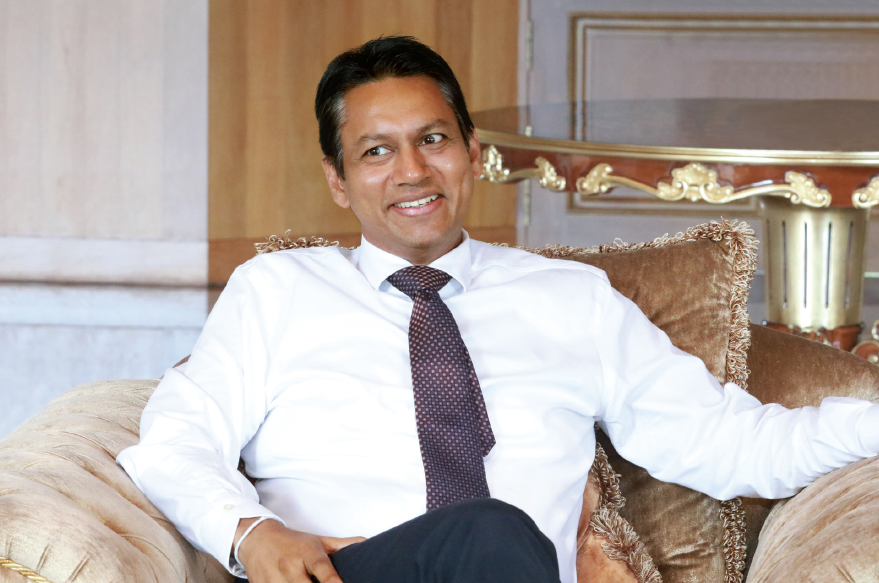
Rushanka Silva.
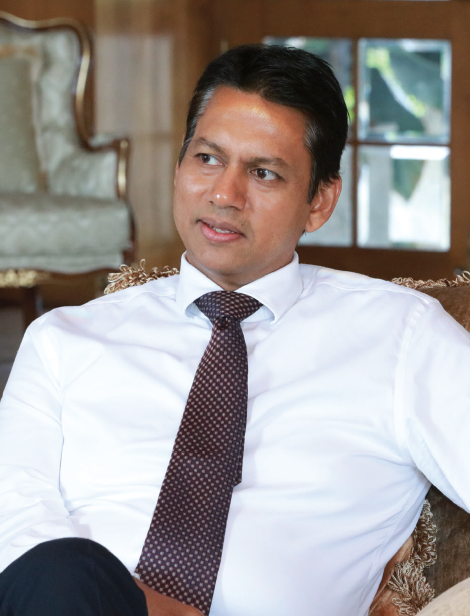
How have you been under the radar despite being a leading businessman in Sri Lanka when others would give anything for visibility?
Seeking the limelight is not in my nature. I have been carrying out charity initiatives and outreach programs for a long time, such as supporting the country’s health sector infrastructure and disadvantaged communities. As a young entrepreneur in my twenties, I have felt the calling to help and uplift the underprivileged, a concern that spurs me into action to help where help is needed. Today, as the Chairman of Indra Traders, I continue to helm the organization with my decisions, supported by my family. At the same time, our community-centered programs are integral to everything we do.
Are you proud of being a native who built a great business?
I love my country. There’s no greater satisfaction than contributing to my country’s development by investing my talent and money in businesses that trickle down to enrich and uplift many in this country. I feel privileged to be a businessman who can add value to other people’s lives by providing them employment.
Steadfastness and pushing the boundary to reach the next level yield results. There’s no other way to succeed. It’s sometimes a gamble, a risk and a chance, but because people were ready to do that, the world has moved to better things.
Today, many people may not see any hope in this country. But if anyone focuses and dedicates themselves to where they want to be in life, their mission, there are plenty of opportunities. There is no easy way to do anything. Hard work and effort are prerequisites of success in any field, which drives businesses and careers to the next level. Nothing moves or improves when people remove themselves from the journey they want to take. Steadfastness and pushing the boundary to reach the next level yield results. There’s no other way to succeed. It’s sometimes a gamble, a risk and a chance, but because people were ready to do that, the world has moved to better things. We have moved to better things and expanded our business into more promising areas.
What would be your advice to aspiring entrepreneurs?
Be honest. Honesty is the key to success. Skill and talent are essential to manage a business successfully. Every emerging entrepreneur should be ambitious, committed, and persistent. Push boundaries. Be resilient and hard-working. Challenges and obstacles are inevitable in any industry. A good entrepreneur will carry on despite them. I continued to focus and grow my business through various upheavals in the country because I was committed to my vision and mission and was determined and tireless in my quest to reach the goals I had set for myself.
How did you manage the challenges as you expanded into property development and leisure sectors? In the future, what other areas are you exploring for expansion?
Rushanka Silva: When we went into housing and leisure, we evaluated the potential for growth in those sectors despite the unexpected blitz we encountered when we ventured into those projects. Leisure is a critical component of the local economy, and with the country achieving the targeted number of tourist arrivals for 2023, which has reached a million, we are confident that we will continue this growth trajectory as we advance. Hence, it gives an excellent opportunity to invest in hotels and develop untapped areas in the sector to leverage the growth in arrivals.
Trizen is our debut project in housing, a massive undertaking in one of the most sought-after locations in Colombo. Despite starting at the end of 2018, the unprecedented events that followed in 2019 held us back; during this time, we went through make-or-break moments that pushed us to take a great leap of faith to pursue.
We couldn’t turn back once we had entered into a project of such enormity, and we had the confidence of the backing of a trustworthy partner in John Keells Properties, who also took the bold call to continue, a decision that is seeing results coming to fruition. The project’s cost, in the meantime, has catapulted from a dollar value below 200 rupees to unprecedented fluctuations that drastically altered our budgets. I’m proud that we are among a few such projects that continued as we made a conscious call to proceed despite the massive cost changes. We value the trust placed upon us by our customers who have invested in our project and are eagerly awaiting their apartments. Because we didn’t back down when the going was tough, today, we continue the trust legacy built carefully by our father through Indra Traders. And I’m happy to say that despite the challenges in the last four years, Trizen has beaten the odds to be built within the shortest time, ready for occupation by early 2024.
Cinnamon Red had disruptions brought upon by the lockdowns, work interruptions and labor shortages. However, our belief in the strength and potential of the leisure industry led us to carry on even as the fallout from the economic crisis unraveled with rising costs driven by a devalued rupee. Under these circumstances, we could not avoid the inevitability of project cost overruns. Import restrictions also impact the project, impeding us from making the required value additions to the hotel. Considering that our project is in an industry vital for revenue generation and economic success, it will be encouraging to see government decisions that would expedite projects lagging due to unprecedented events in the past.
Our country has been through highs and lows, pitting businesses against many uncertainties. While some industries have been resilient to the pitfalls, others have succumbed to the pressure. In such an environment, our future expansions will have to focus on industries and sectors that will withstand the onslaughts of changes and crises that are likely to be local and global in scale.
We didn’t back down when the going was tough, today, we continue the trust legacy built carefully by our father through Indra Traders.
You have taken over as the deputy chairman of Sampath Bank and Siyapatha Finance. How is the industry faring?
Rushanka Silva: Since 2019 and the upheaval during the COVID-19 pandemic, the nation’s economy faced tremendous challenges. The banks were under enormous pressure due to challenges faced by their customers, especially from the SMEs and the retail sector. During these difficult times, the banks had to offer debt moratoriums and structure loan repayments to support distressed businesses. But our banking sector is formidable, which gives it resilience amid the disruptions given its portfolio of capital and liquidity buffers that helped manage the stress on liquidity and revenue loss from missed loan payments. Banks must identify extraordinary situations when responding to their customers and do their utmost to nurture industries that are resilient and have potential while managing their risks.
Twenty-twenty-two was incredibly challenging for Sri Lanka as we gradually recovered from the pandemic. A devalued currency and increased interest rates, together with double-digit inflation, were the highest in the history of Sri Lanka, which impacted trade activities, plunging businesses into distress. Banks also faced a rise in bad loans due to adverse macroeconomic conditions. The economic crisis posed a double whammy for many with increased interest rates and a devalued rupee. Hence, banks supported businesses operating in critical sectors that are significant to the economy but also vulnerable to economic upheavals. But despite the adverse situation that the country experienced in 2022 and stretched into 2023, I am confident that the banking industry is on the verge of recovery and poised for growth.
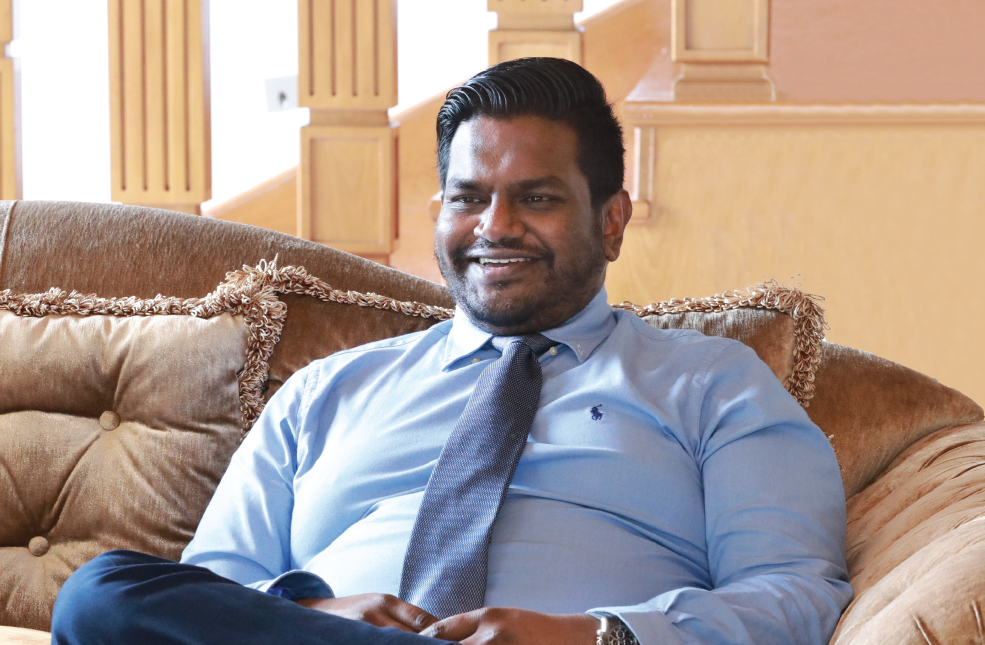
Hashindra Silva
How did you sustain your motor vehicle business despite import restrictions?
Rushanka Silva: Indra Traders began its journey as a dealer in motor vehicles and, over the years, expanded its reach exponentially to over twenty locations in the country while growing our offering with ancillary services in after-maintenance and services, repairs and spare part sales. The newest import restrictions meant we had to change our strategy to stay in business.
Therefore, we had to change course by altering our business model, whereby we kept our operations going by buying vehicles from our customers for reselling, a process we executed meticulously and in keeping with the core value of maintaining trust.
We urge the government to reconsider importing suitable motor vehicles because the transport industry drives the country’s economic growth. The spillover effect of the transport industry to spur economic growth is enormous, given the direct and indirect jobs it generates in addition to facilitating sectors and services which need mobility and transport while being a vital source of State revenue. Given the current situation, we are taking a prudent wait-and-see approach before considering new opportunities.
Hashindra Silva: As mentioned, we turned internally to trade-in vehicles by carefully selecting to purchase vehicles from our customers, which we sold. We leveraged that new working model by following stringent procedures to ensure we bought only the best to sell confidently to customers while ensuring quality. That way, we managed to stay in business and retain our teams despite the import restrictions.
The ban on vehicle imports also led us to leverage the strength of our other services in maintenance, servicing and spare parts. Like our core business, we have maintained impeccable standards in after-sales service delivery and spare parts, which we promoted vigorously. Given the uncertainty in the market for new vehicles and the unaffordability of new vehicles amid the crisis, owners sought to ensure their vehicles were in the best of health, and we, in turn, focused on offering the best services to meet their requirements. So, the main reason we managed to continue the business was that we had made it into a one-stop-shop for purchasing, after-sales and spare parts, which ensured that our customers returned to us for auxiliary services after buying their vehicles. In this instance, our emphasis on building trust through honesty helped us sustain our customers and the business. As the government has indicated, restrictions will be relaxed, and we can access vehicles from out, although the forex rate is a concern.
What lessons have you learnt from your father, and how different is the business environment today?
Rushanka Silva: We have learnt the core values of building a business on trust. The business environment today is a challenging and complex one. The market has also evolved, but we are ready to navigate it because our father has always insisted on retaining and treating customers honorably. My father’s success as a businessman was his savviness. Despite the odds, he was a savvy investor who managed to navigate the vicissitudes and managed his workforce very well, keeping lines of communication open with all levels of employees. He was also smart enough to choose the best people for his team, got the best out of them and constantly adhered to the best practices in his trade. Today’s business environment demands a drastic shift in increasing efficiency, productivity and work practices. An attitudinal change towards work is sorely needed today. Sri Lankans are not poorly skilled, as they have shown how much they can work elsewhere. Hence, as we seek to retain our talents and qualified individuals, we must address the issue of how best to bring the best out of people, which was an essential lesson from my father to all of us.
Hashindra Silva: We have much to learn from our father. He is humble and down to earth. He knows the pulse of the customer, and his priority is to win the loyalty and trust of the customer through honesty. He still guides us as we take over the diversified company into the future. Our father built a brand from scratch, and thanks to his perceptive leadership, he established a respected brand that is synonymous with him. He made Indra Traders a sought-after vehicle dealer associated with quality and trust. Today, we have a loyal customer base that includes members of the next generation because of the relationship my father built with them and his consistent commitment to running an honest business. We continue that relationship of trust through after-service, maintenance and spare parts sales.
